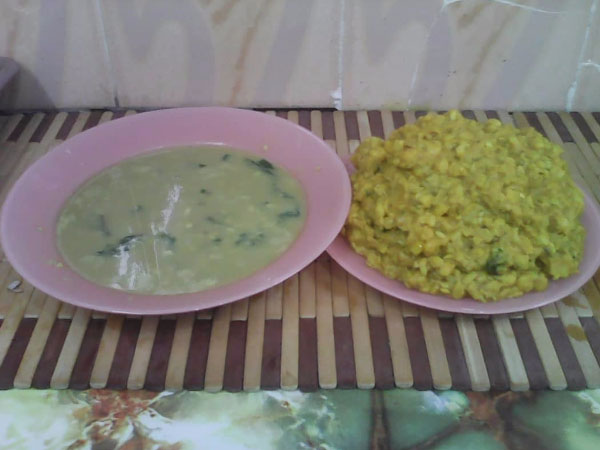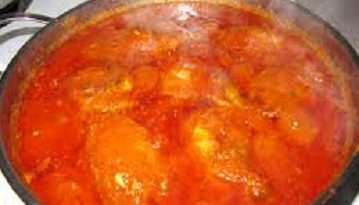How to Lose Weight on Nigerian Diet: Detailed Guide
How to Lose Weight on Nigerian Diet: A Step-By-Step Guide. Please Watch >>>>

- Best Nigerian Food Options for Weight Loss
Weight loss is one of the most popular topics on the internet, owing to a large number of individuals interested in learning how to lose weight.
Millions of Nigerians are attempting to shed weight and overcome obesity. They’ve been trying to figure out how to lose weight in Nigeria and seeking Nigerian cuisine that can help them do so.
Related >>>>>
- Healthy Nigerian Breakfast Ideas: Breakfast Timetable in Nigeria
- Nigerian food Guide: How to create a properly balanced diet
- Top 8 Healthy Nigerian Foods to Keep the Doctor away
- Cloves for weight loss: clove water benefits & Tea side effects
- Aju Mbaise: How to Get a Flat Stomach |Lose Weight | Look good
How to Lose Weight on Nigerian Diet
In short, losing weight on a Nigerian diet is more difficult than it appears because the majority of our meals are high in carbohydrates.
However, if you identify which meals, you should avoid and replace them with healthier alternatives, you will see results in a short period.
This post offers the greatest Nigerian weight loss foods that will assist you in losing excess fat in your body starting with breakfast
The good news is that you can find all of the foods listed here in your area or at your local grocery store.
Is it possible to gain weight by eating Nigerian food? How To Lose Weight on Nigerian Diet?
Unfortunately, yes. Nigerian meals are often high in protein, lipids, and carbohydrates, which leads to the sole drawback: due to their high-fat, high-carb content, you can quickly gain a lot of weight by eating these dishes daily.
There is yet hope. You may still eat Nigerian food by swapping lower-carb alternatives for high-carb dishes without sacrificing the distinctive flavors.
Is It Possible to Lose Weight Eating Nigerian Food? How to Lose Weight on Nigerian Diet
The good news is that you absolutely can! You may lose weight eating Nigerian food by replacing low-carb meals with high-carb dishes.
A low-carb (or keto) diet is a low-carb, high-fat, medium-protein diet that helps you lose weight quickly while also providing a slew of additional advantages.
How to lose weight in Nigeria ~ How to Lose Weight on Nigerian Diet
The combination of a good weight reduction diet and regular exercise is the key to successful weight loss.
Finding a suitable weight reduction diet, on the other hand, is difficult, especially if you don’t know anything about calories.
Many Nigerians are in this situation because it is difficult for a typical Nigerian who eats indigenous Nigerian foods to know which meals to eat to lose weight.
If you want to know how to lose weight quickly in Nigeria, you need to be aware of the various Nigerian weight reduction meals accessible.
Many Nigerian meals, snacks, and dishes are excellent for weight loss, therefore losing weight in Nigeria is possible.
Remember that any excellent weight loss diet should be able to accelerate your metabolism, make you feel satiated sooner, contain a modest number of calories, and aid in fat burning.
Here’s how a low-calorie Nigerian breakfast diet might aid weight loss.
To begin planning your weight-loss meal plan based on traditional Nigerian or other African cuisines, remember to start with the basics:
leafy greens, vegetables, fruit, whole grains, legumes, and fish. These items can be used to create some intriguing recipes.
Breakfast ~ How to Lose Weight on Nigerian Diet
So, the first weight-loss myth to refute is that you must forgo breakfast. While this may be effective in the short term, it is just not a long-term answer.
Others advise drinking a lot of warm water first thing in the morning, well good luck with that.
Breakfast is believed to be the most important meal of the day, and those who said it wasn’t lying.
There are a few things that can happen if you don’t eat breakfast:
- a) In the late mornings, you may begin to feel weary, have headaches, and have trouble concentrating, all of which can influence your performance.
- b) Missing breakfast makes you hungry later in the day, and you’re more likely to eat unhealthy snacks and drinks, which negates the aim of calorie restriction.
You must understand that the average individual requires between 1400 and 2300 kilocalories (kcal) each day to maintain their weight (depending on their size, age, and gender).
There are two main guidelines to follow if you wish to lose weight: How To Lose Weight on Nigerian Diet
- Consume fewer calories
- Exercise/activity can help you burn more calories.
There is a third option, which is the most long-lasting. This strategy entails eating fewer calories while gradually increasing your physical activity.
After you’ve digested these foundational stages, the following step is to choose healthy breakfast selections that will help you achieve your objectives.
The Nigerian diet has always been high in carbs. Why is this the case? Meat has always been and continues to be, an expensive food item in many Nigerian households.
As a result, African diets have traditionally consisted of carbohydrates first, followed by whatever protein is available.
The opposite is true in Western culture, where the meat is normally the entree and the rice is the side dish.
If you want to reduce weight, you must limit carbohydrates, especially processed sugars. Do you know that one piece of bread has between 70 and 140 calories?
Imagine that by the time you’ve eaten 6 slices of bread and added the fried egg, you’ve already ingested 800-1000 kcal, which is more than half of the calories you need in a day, and that’s before you’ve had your tea and milk.
1st step:
Calculate your calorie intake and BMI ~ How to Lose Weight on Nigerian Diet
The first step is to figure out how many calories you require every day.
Numerous online calculators can provide you with an accurate estimate based on your age, height, level of activity, and other factors.
This calculator is great because it also estimates how many calories you should consume per day to lose weight.
These calculators aren’t perfect, but they provide a good starting point. You may calculate your body mass index while you’re at it (BMI).
You are overweight if your BMI is between 25 and 30, and obese if your BMI is greater than 30.
Step 2:
Set Milestones ~ How to Lose Weight on Nigerian Diet
Setting milestones is the next stage. Remember that losing weight is a marathon, not a sprint.
Set goals that you know you can attain because if you don’t meet them by the deadlines, you’ll feel like you’re failing and will eventually give up.
Obtain a scale to determine your current weight.
Then, to help you determine your timetable and targets, estimate the weight you wish to achieve. I recommend that you establish a very long deadline, such as a year.
You face the danger of regaining weight if you lose weight quickly.
If you have a longer time frame, the behavior change will be more lasting, allowing you to keep any weight you’ve dropped.
After that, you can figure out how many calories you need to burn in a week or month (depending on your deadline)
Step 3: Calorie Count ~ How to Lose Weight on Nigerian Diet
You can start counting calories after you know how many calories you need to reduce in a week or month.
For example, if you need to lose 1 pound per week and lower your daily calorie goal by 400 calories, you should begin consuming nutritious meals.
Several applications can estimate the calories in the foods you’re consuming, and some of them include Nigerian delicacies.
Step 4: Determine which breakfast options are healthy and which are not. It’s not as difficult as you may assume.
Anything with a sweet flavor is likely to be rich in calories and should be avoided. Avoid fried foods – instead of frying an egg, which has over 100 calories when fried in oil, boil it instead.
Consider whole-wheat or multigrain bread instead of white bread. Even better, don’t eat any bread at all. If you must eat bread, only a few pieces will suffice.
I would advise against eating unsliced bread because you may find it difficult to regulate portions and end up eating the entire loaf.
Some people eat cornflakes for breakfast, which is OK except that if you eat a lot of it, you will consume a lot of calories.
The milk you use is also high in calories. Carbohydrates should be avoided in baked pastries, especially if they were made with flour.
Healthy Nigerian Breakfast for Weight Loss Options include: How to Lose Weight on Nigerian Diet
- Whole, mixed fruits, such as bananas and apples, are healthy breakfast options. Sweet fruits include sugar and calories, so limit your intake.
- Fruit smoothies: this breakfast can contain any fruit.
- Oatmeal, such as Quaker-oats cooked oatmeal has roughly 150 calories, four grams of fiber (half soluble, half insoluble), and six grams of protein per cup.
- Oatmeal can also help you lose weight by keeping you fuller for longer. However, watch the amount of milk and sugar you put in the oats.
- Yogurt: This is a great choice because you know precisely how many calories you’re consuming. A banana could also be added to the yogurt.
- A single serving of cooked beans
- Cereal: It’s fine to eat a small amount of cereal. Anything with the word “frosted” on the package should be avoided.
- Tea and coffee are both good choices for breakfast. Milk, whether whole or condensed, should be avoided. It’s fantastic if you can afford low-fat milk.
- If you can’t, try it without or with a small bit of milk. If you can afford it, use zero-calorie sweeteners instead of sugar cubes (1 cube = 12 kcalories).
- Bread: If you must consume some, I recommend 2 slices; you can bulk it up with lettuce, tomato, and other vegetables.
- If you think this will be too light, pair it with a banana or an orange.
- Boiled plantains
- Flourless scotch eggs
These healthy breakfast selections should be avoided: Nigerian food to avoid when losing weight ~ How to Lose Weight on Nigerian Diet
- Margarine or butter
- White bread, especially unsliced
- Baked pastries
- Carbohydrate-rich foods such as rice and yam If you must, consume a tiny amount, but avoid fried yam. Boiling yam in little amounts could be a good idea.
- Avoid frying puff-puff, akara, yam, and plantains with oil (bad idea).
In summary, if you’re serious about losing weight, you should avoid frying anything for breakfast.
- Orange juice: many people have failed to stick to their weight-loss regimens after drinking orange juice. Juices are high in calories, which many people are unaware of. One cup of orange juice contains over 100 calories.
- If you must cook pancakes, do not fry them.
- Pap (also known as ogi or akamu): a modest amount is acceptable.
- Drinking garri first thing in the morning is usually not a smart idea, especially if it’s sweetened.
- Avoid coke and other soft drinks first thing in the morning. If you have to drink them, make sure they’re low in calories and sodium
What Nigerian food can I eat to lose weight?
Best Nigerian Foods for Weight Loss
- The secret is in the phytochemicals
- Berries AKA ‘tiny-but-mighty’ are full of antioxidants and fiber
- Avocado is a unique type of fruit
- Olive and Olive Oil. “Extra Virgin olive oil” is probably the healthiest fat on the planet
- Watermelon
- Apples
- Pears
- Bananas
How do I lose weight using the Nigerian diet and little exercise?
How do I lose weight using the Nigerian diet and little exercise?
- Drink water. A lot
- No more vegetable oil. You should consider using less oil if you want to lose weight
- Be careful with the salt
- Less Carbohydrate
- More spice
- The red meat
- No more high calories snacks
- More fiber
What Nigerian foods are low in calories?
Low-Calorie Nigerian Foods
- Cabbage is quite low in calories, healthy and delicious
- Cucumber is another nutritious vegetable that is super low in calories
- Carrots are not only low in calories, but they taste good
- Okra
- Tomatoes
- Garlic
- Onions
- Peppers
How can I get a flat stomach in Nigeria?
6 Ways to Lose Excess Belly Fat
- Increase your protein intake.
- Eat breakfast every day.
- Drink plenty of water.
- Limit your carb intake.
- Exercise regularly.
- Cut out added sugars.
Is Egusi soup good for losing weight?
Another delicacy that you can enjoy on a keto diet is egusi soup. This soup, made primarily from melon seeds in Africa, is both delicious and nutritious.
It also has plenty of meat, fish, and other high-quality proteins. It is high in vitamins A, B1, B2, and C.
What does a typical Nigerian diet consist of?
Maize, yams, cassava, and plantains are traditional Nigerian foods.
Tomato stew, porridge, soups like egusi soup, and jollof rice are typical Nigerian dishes.
All of these foods can be combined to make a Nigerian-inspired meal
Which African foods are good for weight loss?
African foods that can help with weight loss include, Spinach, Ofada rice, sweet potatoes, water leaf, walnuts, beans, avocado, oats, unripe plantain
Which Nigerian soup is best for losing weight?
Edikaikong or afang soup is also an excellent Nigerian weight loss food.
Afang soup has a low-calorie count of 367 (approximately) when compared to other Nigerian soups. It also contains a lot of fiber and vegetables.
Which fruits are helpful for weight loss?
Here are 11 of the best fruits to eat for weight loss.
- Grapefruit
- Apples are low in calories and high in fiber, with 116 calories and 5.4 grams of fiber per large fruit (223 grams)
- Berries are low-calorie nutrient powerhouses
- Kiwifruit
- Melons
- Stone Fruits
- Passion Fruit
- Rhubarb
Is Fufu good for weight loss?
The answer is No. The calories are still too high.
What is the healthiest Nigerian food?
Waterleaf improves blood circulation, boosts immunity, and aids weight loss.
- Edikang Ikong Soup.
- Moin Moin for the culture.
- Ofada rice and beef sauce.
- Egusi soup
- Unripe plantain porridge.
What Nigerian foods are low in carbs?
Here are seven non-carbohydrate foods in Nigeria.
- Eggs are rich in protein and a range of other nutrients but very low in carbs
- Fish and other animals that reside in water can be a great inclusion to your diet
- Dairy foods
- Beans
- Fruits
- Meat
- Vegetables
- Nuts and seeds
Which fruit is good for weight loss in Nigeria?
Bananas are one of the best fruits for weight loss in Nigeria because they are filling and prevent hunger.
Though high in calories, they are high in healthy fibers, which help curb appetite, burn fat, and lower blood pressure.
Does Nigerian food make you gain weight?
Nigerian Swallows
Nigerian foods that can help you gain weight include akpu or fufu, amala, eba, and semolina.
Pounded yam is another healthy option. The Pounded yam is high in carbohydrates and calories, both of which are necessary for weight gain.
Which biscuits are good for weight loss in Nigeria?
Some healthy Nigerian biscuits can help you eat healthily and achieve your weight loss goals.
- Mcvities Digestive Biscuits
- Malted Milk Biscuits
- Cream Cracker Biscuits
- Mcvities Rich Tea
- Cabin Biscuits
What can I drink to make my stomach flat? Best Drinks to Have Every Day for a Flat Belly
- Peppermint Tea.
- Yogurt Drinks.
- Kombucha
- Dandelion Root Tea.
- Aloe Vera Juice.
- Coconut Water.
- Pineapple Juice.
- Ginger Tea.
What can I drink to lose belly fat in a week?
Morning drinks that will aid your fat-burning journey:
- Warm water with lime and honey
- Jeera water
- Fennel water
- Cinnamon water
- Amla juice and warm water
- Ginger water.
What can I eat for breakfast in Nigeria?
10 common Nigerian breakfast dishes
- Bread Sandwich with a hot beverage.
- Instant noodles and egg.
- Moi-Moi with custard or pap.
- Cereal
- Okpa
- Ewa Agoyin with Agege bread or any soft and elastic bread.
- Hausa Koko and Koose (Spicy millet porridge and akara)
- Fried plantain and yam with egg stew.
Does garri help in weight loss?
Loss of weight
Go for garri if you’re trying to lose weight. Although garri is a starchy food, it is low in calories and high in fiber, which will help you stay fuller for longer.
As a result, the desire to eat in large quantities is reduced.
Is yam good for losing weight?
The roots of yams contain glucomannan, a beneficial fiber that is thought to aid in weight loss.
When fiber is consumed, it transforms into a gel that sits in your stomach and allows you to feel fuller for longer.
As a result, your cravings are reduced, and weight loss is more attainable.


